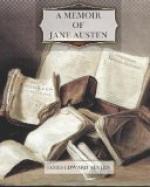She was a clever woman, and highly accomplished, after the French rather than the English mode; and in those days, when intercourse with the Continent was long interrupted by war, such an element in the society of a country parsonage must have been a rare acquisition. The sisters may have been more indebted to this cousin than to Mrs. La Tournelle’s teaching for the considerable knowledge of French which they possessed. She also took the principal parts in the private theatricals in which the family several times indulged, having their summer theatre in the barn, and their winter one within the narrow limits of the dining-room, where the number of the audience must have been very limited. On these occasions, the prologues and epilogues were written by Jane’s eldest brother, and some of them are very vigorous and amusing. Jane was only twelve years old at the time of the earliest of these representations, and not more than fifteen when the last took place. She was, however, an early observer, and it may be reasonably supposed that some of the incidents and feelings which are so vividly painted in the Mansfield Park theatricals are due to her recollections of these entertainments.
Some time before they left Steventon, one great affliction came upon the family. Cassandra was engaged to be married to a young clergyman. He had not sufficient private fortune to permit an immediate union; but the engagement was not likely to be a hopeless or a protracted one, for he had a prospect of early preferment from a nobleman with whom he was connected both by birth and by personal friendship. He accompanied this friend to the West Indies, as chaplain to his regiment, and there died of yellow fever, to the great concern of his friend and patron, who afterwards declared that, if he had known of the engagement, he would not have permitted him to go out to such a climate. This little domestic tragedy caused great and lasting grief to the principal sufferer, and could not but cast a gloom over the whole party. The sympathy of Jane was probably, from her age, and her peculiar attachment to her sister, the deepest of all.
Of Jane herself I know of no such definite tale of love to relate. Her reviewer in the ‘Quarterly’ of January 1821 observes, concerning the attachment of Fanny Price to Edmund Bertram: ’The silence in which this passion is cherished, the slender hopes and enjoyments by which it is fed, the restlessness and jealousy with which it fills a mind naturally active, contented, and unsuspicious, the manner in which it tinges every event, and every reflection, are painted with a vividness and a detail of which we can scarcely conceive any one but a female, and we should almost add, a female writing from recollection, capable.’ This conjecture, however probable, was wide of the mark. The picture was drawn from the intuitive perceptions of genius, not from personal experience. In no circumstance of her life was




